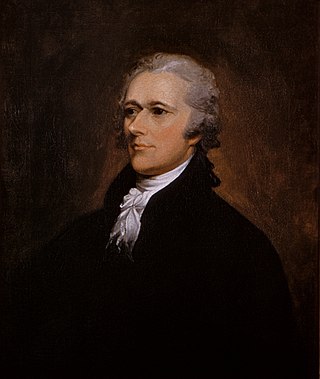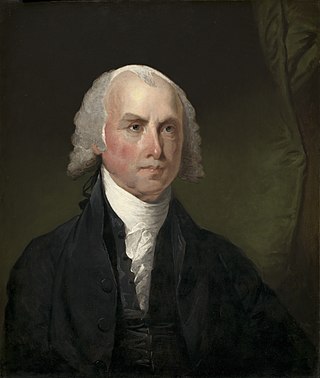
The Federalist Papers is a collection of 85 articles and essays written by Alexander Hamilton, James Madison, and John Jay under the collective pseudonym "Publius" to promote the ratification of the Constitution of the United States. The collection was commonly known as The Federalist until the name The Federalist Papers emerged in the twentieth century.
Anti-Federalist Papers is the collective name given to the works written by the Founding Fathers who were opposed to, or concerned with, the merits of the United States Constitution of 1787. Starting on 25 September 1787 and running through the early 1790s, these Anti-Federalists published a series of essays arguing against the ratification of the new Constitution. They argued against the implementation of a stronger federal government without protections on certain rights. The Anti-Federalist papers failed to halt the ratification of the Constitution but they succeeded in influencing the first assembly of the United States Congress to draft the Bill of Rights. These works were authored primarily by anonymous contributors using pseudonyms such as "Brutus" and the "Federal Farmer." Unlike the Federalists, the Anti-Federalists created their works as part of an unorganized group.

Federalist No. 23, titled "The Necessity of a Government as Energetic as the One Proposed to the Preservation of the Union", is a political essay written by Alexander Hamilton and the twenty-third of The Federalist Papers. It was first published in New York newspapers on December 18, 1787, under the pseudonym Publius, the name under which all The Federalist Papers were published. This entry shifted the focus of the series, beginning an extended analysis of the proposed constitution and its provisions regarding commerce and national defense.

Federalist No. 78 is an essay by Alexander Hamilton, the seventy-eighth of The Federalist Papers. Like all of The Federalist papers, it was published under the pseudonym Publius.

Federalist No. 2, titled "Concerning Dangers From Foreign Force and Influence", is a political essay written by John Jay. It was the second of The Federalist Papers, a series of 85 essays arguing for the ratification of the United States Constitution. The essay was first published in The Independent Journal on October 31, 1787, under the pseudonym Publius, the name under which all The Federalist Papers were published. Federalist No. 2 established the premise of nationhood that would persist through the series, addressing the issue of political union.

Federalist No. 7, titled "The Same Subject Continued: Concerning Dangers from Dissensions Between the States", is a political essay by Alexander Hamilton and the seventh of The Federalist Papers. It was first published in the Independent Journal on November 17, 1787, under the pseudonym Publius, the name under which all The Federalist Papers were published. It is one of two essays by Hamilton advocating political union to prevent the states from going to war with one another. Federalist No. 7 continues the argument that was developed in Federalist No. 6.

Federalist No. 12 is an essay by Alexander Hamilton, the twelfth of The Federalist Papers. It was first published in The New York Packet on November 27, 1787 under the pseudonym Publius, the name under which all The Federalist papers were published. It is titled "The Utility of the Union In Respect to Revenue".

Federalist No. 25, titled "The Same Subject Continued: The Powers Necessary to the Common Defense Further Considered", is a political essay written by Alexander Hamilton and the twenty-fifth of The Federalist Papers. It was first published in New York newspapers on December 21, 1787, under the pseudonym Publius, the name under which all The Federalist Papers were published. It is one of two essays by Hamilton arguing in favor of a national standing army during peacetime, along with Federalist No. 24.

Federalist No. 26, titled "The Idea of Restraining the Legislative Authority in Regard to the Common Defense Considered", is an essay written by Alexander Hamilton as the twenty-sixth of The Federalist Papers. It was published on December 22, 1787, under the pseudonym Publius, the name under which all The Federalist papers were published. Federalist No. 26 expands upon the arguments of a federal military Hamilton made in No. 24 and No. 25, and it is directly continued in No. 27 and No. 28.

Federalist No. 30 is an essay by Alexander Hamilton, the thirtieth of The Federalist Papers. It was first published in the New York Packet on December 28, 1787, under the pseudonym Publius, the name under which all The Federalist papers were published. This is the first of seven essays by Hamilton on the then-controversial issue of taxation. It is titled "Concerning the General Power of Taxation".

Federalist No. 31 is an essay by Alexander Hamilton, the thirty-first of The Federalist Papers. It was first published in The New York Packet on January 1, 1788, under the pseudonym Publius, the name under which all The Federalist papers were published. This is the second of seven essays by Hamilton on the controversial issue of taxation. It is titled "The Same Subject Continued: Concerning the General Power of Taxation".

Federalist No. 33, written by Alexander Hamilton and first published in The Independent Journal on January 2, 1788, continues the focus on the issues in creating an efficient taxation system, along with reassuring the people's doubts about the government control over taxation. Titled "The Same Subject Continued: Concerning the General Power of Taxation", No. 33 explores the idea of allowing Congress to make all laws that are necessary for efficiently operating the national government. Under the pseudonym, Publius, John Jay, Hamilton, and James Madison collectively wrote and published eighty-five essays in the New York newspaper between 1787 and 1788 to promote the ratification of the United States Constitution.

Federalist No. 35 is an essay by Alexander Hamilton, the thirty-fifth of The Federalist Papers. It was first published in The Independent Journal on January 5, 1788 under the pseudonym Publius, the name under which all The Federalist papers were published. This is the sixth of seven essays by Hamilton on the controversial issue of taxation. It is titled "The Same Subject Continued: Concerning the General Power of Taxation".

Federalist No. 34 is an essay by Alexander Hamilton, the thirty-fourth of The Federalist Papers. It was published on January 5, 1788, under the pseudonym Publius, the name under which all The Federalist papers were published. This is the fifth of seven essays by Hamilton on the then-controversial issue of taxation. It is titled "The Same Subject Continued: Concerning the General Power of Taxation".

Federalist No. 36 is an essay by Alexander Hamilton, the thirty-sixth of The Federalist Papers. It was first published in the New York Packet on January 8, 1788, under the pseudonym Publius, the name under which all The Federalist papers were published. This is the last of seven essays by Hamilton on the then-controversial issue of taxation. It is titled "The Same Subject Continued: Concerning the General Power of Taxation".

Federalist No. 52, an essay by James Madison or Alexander Hamilton, is the fifty-second essay out of eighty-five making up The Federalist Papers, a collection of essays written during the Constitution's ratification process, most of them written either by Hamilton or Madison. It was published in the New York Packet on February 8, 1788, with the pseudonym Publius, under which all The Federalist papers were published. This essay is the first of two examining the structure of the United States House of Representatives under the proposed United States Constitution. It is titled The House of Representatives".

Federalist Paper No. 54 is an essay by James Madison, the fifty-fourth of The Federalist Papers. It was first published by The New York Packet on February 12, 1788 under the pseudonym Publius, the name under which all The Federalist papers were published.

Federalist No. 66 is an essay by Alexander Hamilton, the sixty-sixth of The Federalist Papers. It was published on March 8, 1788, under the pseudonym Publius, the name under which all The Federalist papers were published. The title is "Objections to the Power of the Senate To Set as a Court for Impeachments Further Considered".

Federalist No. 81 is an essay by Alexander Hamilton, the eighty-first of The Federalist Papers. It was published on June 25 and 28, 1788 under the pseudonym Publius, the name under which all The Federalist papers were published. The title is "The Judiciary Continued, and the Distribution of the Judicial Authority", and it is the fourth in a series of six essays discussing the powers and limitations of the Judicial branch.

Federalist No. 82 is an essay by Alexander Hamilton, the eighty-second of The Federalist Papers. It was published on July 2, 1788, under the pseudonym Publius, the name under which all The Federalist papers were published. Its title is "The Judiciary Continued", and it is the fifth in a series of six essays discussing the powers and limitations of the judicial branch of government.





